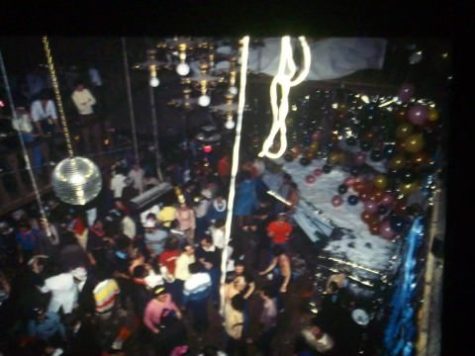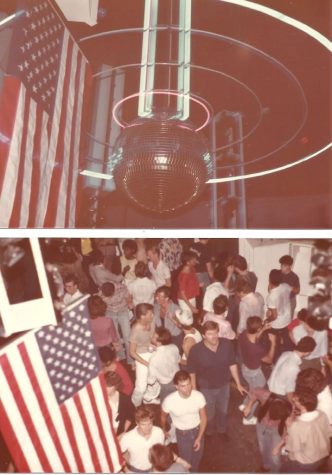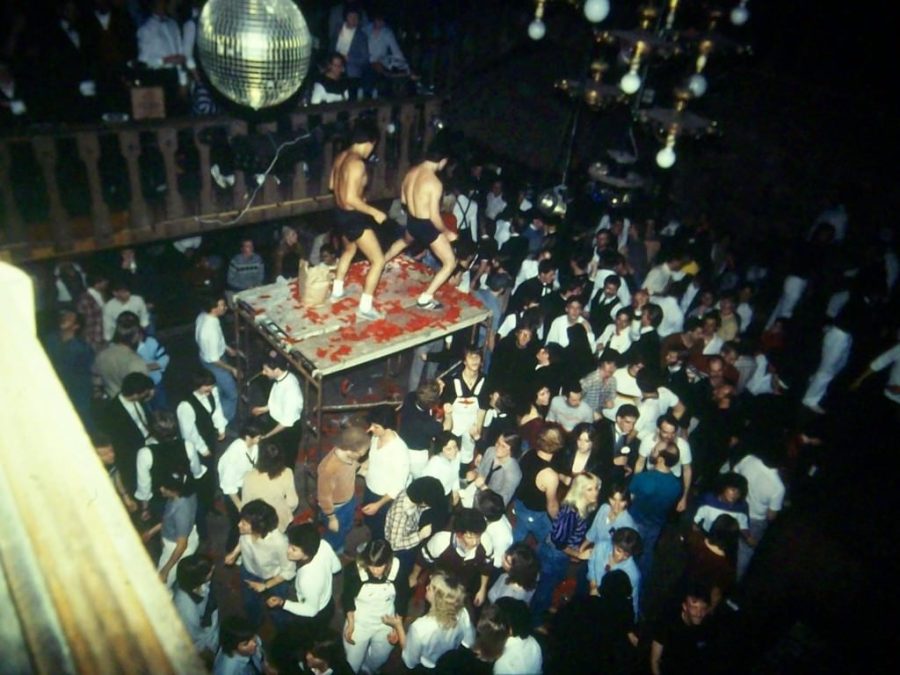CU lacks spaces for LGBTQ+ community
People dance on a table at Chester Street Bar in Champaign. The bar, which was one of Champaign’s only gay bars, closed in 2017.
Dec 8, 2021
Other than the infrequent LGBTQ-themed dance parties held in multiple local bars, there are virtually no spaces in Champaign-Urbana dedicated to the LGBTQ+ community, say LGBTQ+ individuals and activists in the community.
But back in the ‘70s and ‘80s, C-U’s LGBTQ+ scene was bustling with life.
Amy Myers moved to Champaign-Urbana in 1993 when she was 19 and has been involved with the local drag scene ever since. She organizes drag shows featuring local queens and kings and has produced two independent shows so far.
She said there aren’t many spaces in C-U for the local LGBTQ+ community, especially after the closures of many gay bars, including Champaign’s Chester Street Bar, which closed in 2017. She said she’d noticed the lack of gay bars and the complete absence of lesbian bars in Chicago.

This observation is reflected in the dwindling number of lesbian and other gay bars in the U.S.
Get The Daily Illini in your inbox!
According to an Oct. 13 article published by The Lily, only 21 lesbian bars remain in the U.S., a stark contrast from the estimated 200 bars that existed in the 1980s. An NBC article published last April said there are only around 1,000 bars in the U.S. that “cater to men and mixed-gender LGBTQ crowds.”
Myers isn’t the only person who has noticed an absence of gay bars. Doug Barnes is the former DJ at Chester Street. He worked there from 1983-84 but has previous experience working at other gay bars in central Illinois.
Barnes said that when he worked as a DJ, C-U’s gay bar scene was thriving with four or five simultaneously active clubs.
“And now, there’s nothing,” he said. “There’s just nothing. It’s sad because back in the ‘70s, we had so much. Here we are in the 21st century, (and) we got nothing.”
He attributed the end of his DJ career partly to the closure of multiple local gay bars. Currently, he is semi-retired and works in retail.
Myers said gay bars used to be the only place for LGBTQ+ people to meet.
“If you wanted to pick somebody up back in the day, you had to go the gay bar and work for it,” she said. ”Buy somebody some drinks, talk to somebody, get a phone number because there was no Grindr, there was no Tinder, there was no computers or anything, so you had to go out.”
Now with the internet and people’s more inclusive mindsets, spaces dedicated to LGBTQ+ people aren’t as essential to the vitality of the community.
“So, it’s just like a lot of the spaces are going away, and I don’t know why or if it’s because people can go wherever they want to go now whereas they couldn’t before,” Myers said.
She said the number of LGBTQ+ events in C-U increases in September when the community celebrates Pride. After September is over, she said, the number of LGBTQ+ events dwindles “and everybody goes back to their normal life.”
Though businesses profit during Pride month by catering to the LGBTQ+ community, Myers questioned the genuineness of the support.
“Everybody wants our money,” she said. “And everybody wants us to spend money and support their places, but do they really support us?”
As a member of the LGBTQ+ community, Myers said her pride doesn’t go away once September ends.
“I’m gay 365 days a year,” she said. “I’m not gay when gay pride comes around or when (the) Champaign (Uniting Pride) Center does their gay pride. I’m proud of who I am.”

Barnes said there need to be more spaces in C-U dedicated to LGBTQ+ people. He suggested the creation of another gay bar, which he said would serve as a meeting and hangout space for the community.
“These days, everybody’s welcome pretty much everywhere, but it just would be nice just to have our own space where we would be the majority,” he said.
Myers said gay bars served as a space for LGBTQ+ people to meet one another, saying, “A gay bar is an establishment that’s gay owned and operated, and it’s gay all the time.”
“It doesn’t mean that straight people can’t come,” she said. “It’s just, I just know when I walk in, it’s gonna be gay. Drag queens, more people like me and a business owner who hopefully identifies as some letter of the rainbow.”
Gay bars let LGBTQ+ people support their own community rather than giving it to straight business owners, she said.
“You’re giving to your people,” she said. “You’re giving to people like you. I call them PLUs, people like us.”
Instead of going to bars in C-U, Myers said she either stays home or travels to other non-local gay bars.
“I just go to other places to go out, and I look forward to it, to be around other people,” she said. “Otherwise, I just work and stay home, and I don’t go out as much.”






